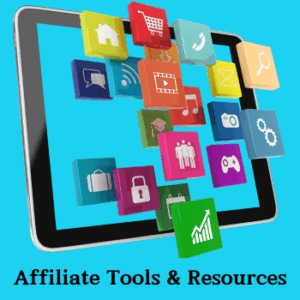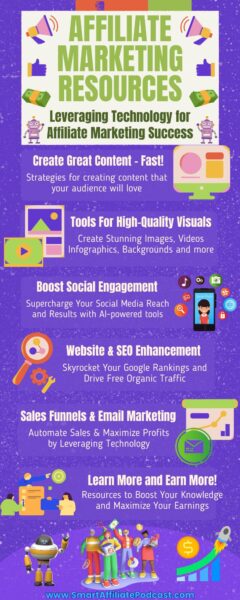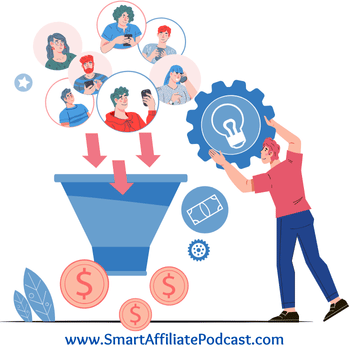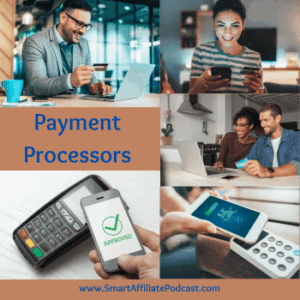 Looking For The Ultimate Affiliate Marketing Toolkit?
Looking For The Ultimate Affiliate Marketing Toolkit?
Look no further! Our comprehensive resource page offers a wealth of tools, tips, and training to help you succeed in the world of Affiliate Marketing. From AI-powered tools to expert-led courses, we’ve got everything you need to build a profitable affiliate marketing business.
Discover essential resources like affiliate marketing software, training materials, and valuable blog posts to guide you every step of the way. Whether you’re a seasoned pro or just starting out, our curated collection of affiliate marketing resources will equip you with the knowledge and tools to achieve your goals.
For Future Reference, Bookmark This Resource Page
Easy Navigation: Use These Quick Links to Find What You Need – Fast!
Essential Tools and Software for Affiliate Marketers
Affiliate Networks – and How to Choose Them
 Affiliate networks are essential platforms that connect you with various products or services to promote. Selecting the right network for your chosen niche can significantly impact your success as an affiliate marketer.
Affiliate networks are essential platforms that connect you with various products or services to promote. Selecting the right network for your chosen niche can significantly impact your success as an affiliate marketer.
Here’s how to choose a network that aligns with your niche and target audience:
- Identify Your Niche and Target Audience:
- Niche: Determine the specific topic or industry you want to focus on (e.g., tech, health, finance, travel).
- Target Audience: Understand your ideal customer’s demographics, interests, and behaviors.
- Research Affiliate Networks:
- Niche-Specific Networks: Look for networks that specialize in your niche. For example, if you’re in the travel niche, consider networks like Booking.com or Expedia’s affiliate programs.
- General-Purpose Networks: Platforms like Amazon Associates, Commission Junction (CJ Affiliate), and ShareASale offer a wide range of products and services.
- Consider the Network’s Reputation: Check reviews and testimonials to gauge the network’s reliability, payment terms, and support quality.
- Evaluate the Network’s Offerings:
- Product or Service Selection: Ensure the network offers products or services that resonate with your target audience and align with your niche.
- Commission Rates: Compare commission structures and payment terms to find the most favorable options.
- Cookie Duration: Consider the length of time cookies remain active on visitors’ devices, as this affects your earning potential.
- Tracking and Reporting: Assess the network’s tracking capabilities and reporting tools to monitor your performance effectively.
- Consider Additional Factors:
- Minimum Payment Threshold: Check if there’s a minimum payout amount before you can receive your earnings.
- Payment Methods: Ensure the network offers payment options that suit your preferences (e.g., PayPal, bank transfer).
- Support and Customer Service: Evaluate the quality of the network’s customer support to address any issues promptly.
 Popular Affiliate Networks:
Popular Affiliate Networks:
- Amazon Associates: A well-known platform for promoting Amazon products.
- Commission Junction (CJ Affiliate): Offers a wide range of products and services from various merchants.
- ShareASale: Another popular network with a diverse selection of affiliate programs.
- ClickBank: Primarily focuses on digital products, such as ebooks and online courses.
- OfferVault: Great for affiliate and CPA offers
- Affbank: Offers Aggregator and Networks directory. Affbank provides you an easy search of offers from different Affiliate Networks
 The Importance of Tracking Software in Affiliate Marketing
The Importance of Tracking Software in Affiliate Marketing
Tracking software is a crucial tool for affiliate marketers. It provides essential data and insights that help you measure the success of your campaigns, identify areas for improvement, and optimize your strategies.
Such software monitors key metrics such as clicks, conversions, click-through rates (CTR), and earnings. This information allows you to assess the performance of your affiliate campaigns, understand which marketing channels and efforts are driving the most conversions, and identify and prevent fraudulent activity.
Popular Tracking Software:
- ClickBank: Offers built-in tracking tools for its affiliate network.
- CAKE: A comprehensive tracking platform with advanced features for affiliate marketing.
- HasOffers: A versatile tracking solution suitable for various affiliate marketing needs.
- Post Affiliate Pro: A popular choice for tracking and managing affiliate programs.
By using tracking software, you can gain a deeper understanding of your affiliate marketing efforts, identify areas for improvement, and ultimately maximize your earnings.
 Link Shortening Tools for Affiliate Marketers
Link Shortening Tools for Affiliate Marketers
Link shortening tools can help you create shorter, neater and more memorable URLs for your affiliate links. This can improve click-through rates and make your links more visually appealing.
Benefits of using link shortening tools:
- Shorter URLs: Create shorter, more visually appealing links that are easier to share and remember.
- Branding: Customize your shortened URLs with your brand name or keywords.
- Tracking: Track clicks and conversions on your shortened links to measure performance.
- Retargeting: Use shortened links to set up retargeting campaigns and reach out to visitors who have shown interest in your offers.
Popular link shortening tools:
- Bitly: A popular choice with features like custom branding and link analytics.
- TinyURL: A simple and easy-to-use link shortening tool.
- gl: Google’s link shortening service, which has been discontinued but may still be used for existing links.
- Pretty Links: A WordPress plugin that allows you to create and manage shortened links from your WordPress dashboard.
- Rebrandly: A comprehensive link management platform with advanced features like link retargeting and QR code generation.
By using link shortening tools, you can improve the appearance and tracking of your affiliate links, making it easier to promote your offers and measure your results.
 Email Marketing Tools for Affiliate Marketers
Email Marketing Tools for Affiliate Marketers
Email marketing remains a highly effective channel for affiliate marketers to nurture leads, build relationships, and drive conversions. Email marketing tools provide essential features to streamline your campaigns, personalize your messages, and track your results.
Key benefits of using email marketing tools:
- List Management: Organize and segment your email subscribers based on demographics, interests, or behavior to send targeted messages.
- Campaign Creation: Design professional and visually appealing email templates with ease, using drag-and-drop editors and customizable layouts.
- Automation: Automate email workflows, such as welcome sequences, abandoned cart reminders, and follow-up campaigns, to save time and improve efficiency.
- A/B Testing: Experiment with different subject lines, content, and designs to optimize your email campaigns for better performance.
- Analytics: Track key metrics like open rates, click-through rates, and conversions to measure the effectiveness of your email marketing efforts.
Popular Email Marketing Tools
- SystemE.io: Email Autoresponder, Sales funnels & more. Click for Free Account
- Mailchimp: A popular all-in-one platform offering a free plan with limited features and paid plans for advanced users.
- ConvertKit: Designed specifically for creators and bloggers, ConvertKit provides powerful automation features and integration with popular platforms.
- AWeber: A long-standing email marketing provider with a user-friendly interface and a variety of features.
- GetResponse: Offers a comprehensive suite of email marketing tools, including landing page builders and webinar hosting.
- ActiveCampaign: A powerful platform with advanced automation capabilities and CRM features.
By leveraging the right email marketing tools, you can effectively nurture your audience, build trust, and drive more conversions through your affiliate marketing campaigns.

Landing Page Builders
The Importance of Landing Page Builders for Affiliate Marketers
Landing pages play a crucial role in affiliate marketing by capturing visitor attention, providing relevant information, and encouraging conversions. Landing page builders simplify the process of creating high-quality landing pages that are optimized for conversions.
Key benefits of using landing page builders:
- Customization: Easily create custom landing pages that align with your brand and messaging.
- Drag-and-Drop Interface: Build landing pages without requiring coding knowledge (Time saver!)
- Templates: Choose from pre-designed templates to get started quickly.
- A/B Testing: Experiment with different landing page elements to optimize for conversions.
- Integration: Integrate your landing pages with other marketing tools, such as email marketing and analytics platforms.
Popular Landing Page Builders
- Leadpages: A popular choice with a wide range of templates and features.
- Unbounce: Known for its conversion-focused templates and advanced features.
- Instapage: Offers a high-performance platform with a focus on speed and conversion optimization.
- Wix Landing Pages: A versatile option that integrates with the Wix website builder.
- ClickFunnels: A comprehensive platform that combines landing page creation with sales funnel building.
By using a landing page builder, you can create compelling and effective landing pages that drive more conversions and increase your affiliate earnings.
 Complete (All in one) Funnel Building Tools:
Complete (All in one) Funnel Building Tools:
Funnel building tools can help you create and optimize sales funnels to convert leads into customers. By using these tools, you can streamline your marketing efforts and increase your affiliate earnings.
Key features of funnel building tools:
- Landing page creation: Design high-converting landing pages to capture leads.
- Email marketing integration: Connect with your email marketing tools to nurture leads and drive sales.
- Sales page creation: Create persuasive sales pages to encourage purchases.
- Membership site creation: Build membership sites to offer exclusive content or services.
- Analytics and tracking: Track the performance of your funnels and make data-driven optimizations.
Popular funnel building tools:
- SystemE.io: A great “All-in-One” platform with a Free Account Available to get you started
- ClickFunnels: A comprehensive platform offering a wide range of features for creating and managing sales funnels.
- Kartra: A all-in-one marketing platform that includes funnel building, email marketing, and membership site features.
- Builderall: A versatile platform with a focus on digital marketing and sales funnel creation.
- Leadpages: Primarily a landing page builder but also offers basic funnel features.
- GetResponse: Offers funnel building features as part of its email marketing platform.
By using funnel building tools, you can create effective sales funnels that guide your leads through the buying journey and increase your affiliate commissions.
 Website Hosting
Website Hosting
Web hosting is essential for creating and maintaining your affiliate marketing website. A reliable web hosting provider ensures your website is accessible to visitors and provides the necessary resources for optimal performance.
Key factors to consider when choosing a web hosting provider:
- Uptime: Ensure your website is available to visitors at all times.
- Speed: A fast website improves user experience and search engine rankings.
- Storage: Consider the amount of storage space needed for your website’s files and data.
- Customer support: Choose a provider with responsive and helpful customer support.
Recommended web hosting providers:
- DreamHost: An excellent and popular choice for WordPress websites, offering affordable plans, speed, dependability and great support.
- Bluehost: Another reliable option for WordPress hosting, with a user-friendly interface.
- HostGator: A versatile provider offering shared, VPS, and dedicated hosting plans.
- GoDaddy: A well-known domain registrar and web hosting provider.
- SiteGround: Known for its speed and performance, SiteGround is a great choice for demanding websites.
By selecting a suitable web hosting provider, you can ensure your affiliate marketing website is reliable, fast, and accessible to your audience.
 SEO Tools
SEO Tools
The Importance of SEO Tools for Affiliate Marketers
Search Engine Optimization (SEO) is essential for driving organic traffic to your affiliate marketing website. SEO tools provide valuable insights and data to help you optimize your content and improve your search engine rankings.
Key benefits of using SEO tools:
- Keyword Research: Identify relevant keywords and phrases that your target audience is searching for.
- On-Page Optimization: Analyze your website’s content and structure to ensure it is optimized for search engines.
- Backlink Analysis: Track and monitor your website’s backlinks to assess your link building efforts.
- Competitor Analysis: Research your competitors’ SEO strategies to identify opportunities and stay ahead.
- Rank Tracking: Monitor your website’s rankings for target keywords.
Popular SEO Tools
- SEMrush: A comprehensive SEO toolset offering keyword research, competitor analysis, backlink tracking, and more.
- Ahrefs: Another powerful tool with features like site audits, keyword research, and backlink analysis.
- Moz: A long-standing SEO tool with a focus on keyword research, link building, and on-page optimization.
- Google Search Console: A free tool provided by Google to monitor your website’s performance in search results.
- Yoast SEO: A popular WordPress plugin for on-page SEO optimization.
By utilizing SEO tools, you can improve your website’s visibility in search engine results, attract more organic traffic, and ultimately increase your affiliate earnings.
Content Creation Tools
 The Importance of Content Creation Tools for Affiliate Marketers
The Importance of Content Creation Tools for Affiliate Marketers
Content creation tools are essential for producing high-quality content that attracts and engages your audience.
These tools can help you create various types of content, including:
- Blog posts: Share informative and valuable content to establish yourself as an authority in your niche.
- Videos: Create engaging video content to showcase products or provide tutorials.
- Images and graphics: Use visuals to enhance your content and make it more appealing.
- Social media posts: Craft compelling content for your social media platforms.
Popular content creation tools:
- Canva: A versatile tool for creating graphics, social media posts, presentations, and more.
- Adobe Creative Suite: Professional-grade tools for graphic design, video editing, and photo editing.
- Grammarly: A writing assistant that helps you improve your grammar, spelling, and style.
- Camtasia: A popular screen recording and video editing tool.
- Wondershare: Video editing software
- Audacity: A free audio recording and editing software.
By utilizing content creation tools, you can produce high-quality content that resonates with your audience and drives conversions.
Payment Processors
Payment processors are typically handled by the vendors you promote, meaning affiliates often don’t need to deal with them directly.
However, it’s worth understanding how payments work in affiliate marketing:
- Vendor’s Role: The vendor is responsible for processing payments from customers who purchase through your affiliate links.
- Affiliate’s Role: Affiliates receive their commissions based on the sales generated through their unique affiliate links.
 While you may not need to choose a payment processor yourself, it’s important to be aware of the payment methods offered by the vendors you promote to ensure a smooth customer experience.
While you may not need to choose a payment processor yourself, it’s important to be aware of the payment methods offered by the vendors you promote to ensure a smooth customer experience.
Common payment processors used by vendors:
- PayPal: A widely used online payment platform.
- Stripe: A popular payment processor with a focus on ease of use.
- Netpay: A reliable payment gateway for businesses of all sizes.
- Braintree: A payment platform owned by PayPal, offering a range of payment options.
- Adyen: A global payment platform with a focus on omnichannel payments.
 Training and Education
Training and Education
Online Courses for Affiliate Marketers
Online courses offer a convenient and flexible way to learn affiliate marketing skills and strategies. Platforms like Udemy, Coursera, and Skillshare provide a wide range of courses taught by industry experts.
 Popular Online Course Providers:
Popular Online Course Providers:
- Udemy: Offers a vast library of courses on various topics, including affiliate marketing.
- Coursera: Partnered with top universities and institutions to offer high-quality online courses.
- Skillshare: A platform focused on creative and professional development, with courses on affiliate marketing and related topics.
- The Smart Online Academy: Our very own Digital Academy with courses on Mastering Affiliate Marketing, Monetizing AI, Traffic, Creating Ads and most aspects of Digital Marketing are covered. There’s an Accredited Diploma in Internet Marketing and there’s even some Free Stuff!
By taking online courses, you can gain valuable knowledge, learn from experienced professionals, and accelerate your journey to success with affiliate marketing.
 Podcasts
Podcasts
The Benefits of Affiliate Marketing Podcasts
Podcasts offer a convenient and engaging way to learn about affiliate marketing from industry experts. By listening to podcasts, you can:
- Gain valuable insights: Discover new strategies, tips, and trends from experienced affiliate marketers.
- Stay updated: Keep up-to-date with the latest developments in the affiliate marketing industry.
- Learn on the go: Listen to podcasts while commuting, working out, or doing other activities.
- Network with other affiliates: Connect with like-minded individuals and build relationships within the affiliate marketing community.
Recommended Affiliate Marketing Podcasts:
- Smart Affiliate Marketing Podcast: No bias whatsoever and a Free Step-by-step guide/checklist is available
- Commission Junction Podcast: Links to the official Podcast from Commission Junction
- The Clickbank “Affiliated” Podcast: Links to the “Affiliated by Clickbank” Podcast
- Pat Flynn’s Smart Passive Income Podcast: Links to Pat Flynn’s popular Podcast
By incorporating podcasts into your learning routine, you can expand your knowledge, stay motivated, and achieve greater success in your affiliate marketing endeavors.
Learning from Blogs, Websites and Social Media Groups
Blogs, websites and relevant Social media groups offer a wealth of information and resources for affiliate marketers.
By following reputable groups, blogs and websites, you can:
- Discover new strategies: Learn about effective affiliate marketing techniques and tactics.
- Stay informed: Keep up-to-date with industry trends and news.
- Connect with other affiliates: Network with like-minded individuals and share experiences.
- Find inspiration: Discover new affiliate marketing opportunities and niches.
Recommended affiliate marketing blogs and websites:
- Smart Affiliate Marketing Blog
- Pat Flynn’s Smart Passive Income Blog
- Authority Hacker Blog
- Gino Prussakov’s Affiliate Marketing Navigator Blog
By exploring these blogs and websites, you can expand your knowledge, gain valuable insights, and stay ahead of the curve in the ever-evolving world of affiliate marketing.
 Books: The Value of Books on Affiliate Marketing
Books: The Value of Books on Affiliate Marketing
Books offer a comprehensive and structured approach to learning affiliate marketing. They provide in-depth explanations, practical examples, and valuable insights from experienced professionals.
Benefits of reading affiliate marketing books:
- Comprehensive knowledge: Gain a deep understanding of affiliate marketing principles and strategies.
- Timeless value: Books provide enduring information that can be referred to for years to come.
- Cost-effective: Books are often a cost-effective way to learn affiliate marketing compared to online courses or workshops.
 Recommended affiliate marketing books:
Recommended affiliate marketing books:
- “Evergreen Passive Income” by Rob Cornish
- “Affiliate Marketing for Dummies” by Michael J. Palmer
- “Affiliate Marketing For Beginners” by Shane Finley
- “Traffic Secrets” by Russell Brunson
By reading these books, you can gain valuable insights, develop a solid foundation in affiliate marketing, and accelerate your journey to success.
Conferences and Events
The Value of Attending Affiliate Marketing Conferences and Events
Attending affiliate marketing conferences and events can be a valuable experience for networking, learning from industry experts, and staying updated on the latest trends. However, it’s important to consider the costs and logistics involved before making a decision.
 Benefits of attending conferences:
Benefits of attending conferences:
- Networking opportunities: Connect with other affiliates, industry professionals, and potential partners.
- Learn from experts: Hear from experienced speakers who share their insights and strategies.
- Stay updated: Learn about the latest trends, tools, and techniques in affiliate marketing.
- Discover new opportunities: Explore potential partnerships and collaborations.
Popular Affiliate Marketing Conferences:
- Affiliate Summit: Held in various locations worldwide, Affiliate Summit is one of the largest affiliate marketing conferences.
- Affiliate World Conference: Offers multiple events in different cities, focusing on global affiliate marketing trends.
- Performance Marketing Summit: A conference dedicated to performance-based marketing, including affiliate marketing.
Costs and logistics:
- Registration fees: Conference registration fees can vary depending on the event and your level of participation.
- Travel expenses: Consider the costs of flights, accommodation, and transportation to the conference location.
- Time commitment: Attending conferences requires planning and time away from your regular work.
A cautionary note: While conferences can be valuable, be aware that some events may focus heavily on sales pitches for high-ticket training courses. Research the conference agenda and speaker lineup carefully to ensure it aligns with your learning goals.
A general rule of thumb is this: If the conference is free OR very low entrance fee, it is likely a pitchfest. If entry is costly, the content should be much better.
By carefully considering the benefits, costs, and logistics, you can decide whether attending a conference is a worthwhile investment for your affiliate marketing journey.
YouTube Channels
Learning Affiliate Marketing Through YouTube Channels
YouTube offers a wealth of free educational content on affiliate marketing. By watching informative videos, you can:
- Visual learning: Learn through demonstrations and examples that can be easier to understand than written content.
- Flexibility: Watch videos at your own pace and convenience.
- Variety of content: Find videos on various affiliate marketing topics, from beginner-level tutorials to advanced strategies.
Recommended Affiliate Marketing YouTube channels:
- Matt Diggity: Provides valuable insights on building authority sites and affiliate marketing.
- Authority Hacker: Offers in-depth tutorials and case studies on affiliate marketing.
- Neil Patel: Shares his expertise on digital marketing, including affiliate marketing strategies.
- Pat Flynn: Offers a variety of content on affiliate marketing, blogging, and entrepreneurship.
- Commission Junction: Provides official YouTube videos with tips and advice for affiliates.
By incorporating YouTube channels into your learning routine, you can gain valuable insights, discover new strategies, and stay motivated in your affiliate marketing journey.
Webinars:
The Pros and Cons of Attending Webinars for Affiliate Marketing
Webinars offer a convenient and interactive way to learn about affiliate marketing from industry experts. However, it’s important to be aware of both the benefits and drawbacks before signing up.
Pros of attending webinars:
- Convenience: Webinars can be attended from the comfort of your own home or office.
- Accessibility: Many webinars are offered at affordable prices or even for free.
- Interactivity: Webinars often allow for Q&A sessions and live interaction with the speaker.
- Time-saving: Webinars can be a more efficient way to learn compared to attending in-person events.
Cons of attending webinars:
- Sales pitches: Many webinars are used as a marketing tool to promote products or services.
- Limited engagement: Online interactions may not be as personal as in-person events.
- Technical difficulties: There may be technical issues that disrupt the webinar.
- Lack of networking: Webinars may not offer the same networking opportunities as in-person events.
Tips for choosing effective webinars:
- Research the speaker: Look for webinars hosted by reputable experts in the field.
- Check the agenda: Ensure the webinar covers topics relevant to your affiliate marketing goals.
- Be prepared to ask questions: Take advantage of the Q&A session to clarify any doubts.
- Be mindful of sales pitches: Be aware of the webinar’s purpose and don’t feel pressured to make a purchase.
By carefully considering the pros and cons, you can determine whether attending webinars is a valuable learning method for your affiliate marketing journey.
Recommended Reading List:
The Importance of Continuous Learning in Affiliate Marketing.
Affiliate marketing is a dynamic field that is constantly evolving.
To stay ahead of the curve and achieve long-term success, it’s essential to engage in continuous learning.
By investing time in education and development, you can:
- Stay updated: Keep up-to-date with the latest trends, best practices, and emerging technologies.
- Expand your knowledge: Gain a deeper understanding of affiliate marketing principles and strategies.
- Improve your skills: Develop new skills and enhance your existing abilities.
- Adapt to change: Be prepared to adapt to changes in the industry and market conditions.
Recommended Reading List:
- “Affiliate Marketing: An Insider’s Guide” by Pat Flynn
- “Evergreen Passive Income With Affiliate Marketing“ by Rob Cornish
- “The Ultimate Guide to Affiliate Marketing” by Ann Smarty
- “Affiliate Marketing for Dummies” by Michael J. Palmer
- “Affiliate Marketing: A Step-by-Step Guide to Online Success” by Chris Carpenter
- “The Authority Hacker Podcast” (Podcast)
- “Smart Passive Income Podcast” (Podcast)
- “Commission Junction Blog” (Blog)
- “Neil Patel” (Blog)
- “Authority Hacker” (Website)
This recommended reading list offers a variety of resources to help you expand your knowledge and skills in affiliate marketing. By incorporating continuous learning into your routine, you can position yourself for long-term success in this dynamic field.
 Legal and Compliance
Legal and Compliance
FTC Guidelines for Affiliate Marketing
The Federal Trade Commission (FTC) has established guidelines to ensure fair and transparent affiliate marketing practices. These guidelines aim to protect consumers and prevent deceptive or misleading advertising.
Key points of the FTC guidelines:
- Disclosure: Affiliates must clearly disclose their relationship with the product or service they are promoting. This disclosure should be prominently displayed in a manner that is easily noticeable to consumers. For example, you could use phrases like “I am an affiliate for this product” or “I earn a commission from sales made through this link.”
- Endorsements: If you make claims about a product or service, you must have a reasonable basis for those claims. Endorsements should reflect your honest opinions and experiences.
- Subjective claims: Claims that are subjective or based on personal opinions do not require substantiation. However, claims that are objective or measurable must be supported by evidence.
- Misleading advertising: Avoid making false or misleading claims about products or services. This includes claims about prices, performance, or benefits.
- Prohibited practices: The FTC prohibits certain practices, such as the use of hidden fees or deceptive tactics to induce consumers to make purchases.
By adhering to these guidelines, affiliate marketers can avoid legal issues and maintain a positive reputation in the industry.
Additional guidance on disclosure requirements:
- Clear and conspicuous: Disclosures should be easily visible and understandable to consumers. They should not be buried in fine print or hidden in a way that makes them difficult to find.
- Specific: Disclosures should clearly identify the affiliate relationship, such as “I am an affiliate for this product.” Avoid vague or ambiguous language.
- Consistent: Disclosures should be consistent across all promotional materials, including websites, social media, and emails.
- Contextual: The disclosure should be placed in a context that makes it clear that it is related to the affiliate relationship. For example, if you are promoting a product in a blog post, the disclosure should be included in the post itself.
By following these disclosure requirements, affiliate marketers can ensure that consumers are aware of their affiliate relationships and can make informed purchasing decisions.
 Privacy Laws and Affiliate Marketing
Privacy Laws and Affiliate Marketing
As an affiliate marketer, it’s essential to comply with privacy laws to protect your users’ data and avoid legal consequences. Two of the most prominent privacy regulations are the General Data Protection Regulation (GDPR) and the California Consumer Privacy Act (CCPA).
GDPR (General Data Protection Regulation):
Scope: Applies to any organization that processes the personal data of EU residents, regardless of location.
Key requirements:
- Obtain explicit consent from individuals before collecting and processing their data.
- Provide clear information about how data is collected, used, and stored.
- Give individuals the right to access, rectify, erase, and restrict the processing of their data.
- Implement appropriate technical and organizational measures to protect personal data.
CCPA (California Consumer Privacy Act):
Scope: Applies to businesses that operate in California and meet certain revenue and data criteria.
Key requirements:
- Provide consumers with a notice of their privacy rights.
- Allow consumers to opt-out of the sale of their personal data.
- Provide consumers with the right to access and delete their personal data.
- Implement reasonable security measures to protect personal data.
Other privacy laws:
Canada’s Personal Information Protection and Electronic Documents Act (PIPEDA): Similar to the GDPR, PIPEDA applies to organizations that collect, use, or disclose personal information of Canadian residents.
Brazil’s General Data Protection Law (LGPD): A comprehensive privacy law that aligns with the GDPR and CCPA.
Tips for complying with privacy laws:
- Review your privacy policies: Ensure your privacy policies are up-to-date and comply with applicable laws.
- Obtain consent: Obtain explicit consent from users before collecting and processing their personal data.
- Implement security measures: Use appropriate technical and organizational measures to protect personal data.
- Stay informed: Keep up-to-date with changes in privacy laws and regulations.
By understanding and complying with privacy laws, affiliate marketers can protect their users’ data, build trust, and avoid legal risks.
 Copyright and other Intellectual Property Considerations for Affiliate Marketers
Copyright and other Intellectual Property Considerations for Affiliate Marketers
When promoting products or services as an affiliate, it’s essential to be mindful of intellectual property rights, such as copyrights and trademarks. Using copyrighted material without proper permission can lead to legal issues.
Key considerations:
- Content use: When creating promotional materials, ensure you have the necessary rights to use any images, text, or other content associated with the product or service you are promoting.
- Copyright infringement: Avoid infringing on the copyright of others by using their content without permission. This includes using copyrighted images, logos, or text.
- Trademark infringement: Respect the trademarks of the products or services you promote. Do not use them in a way that could mislead consumers or infringe on the trademark owner’s rights.
- Original content: Create original content that promotes the product or service without relying heavily on copyrighted material.
- Fair use: In some jurisdictions, there are exceptions to copyright infringement known as “fair use” or “fair dealing.” These exceptions may allow for limited use of copyrighted material for purposes such as criticism, comment, news reporting, teaching, scholarship, or research. However, it’s important to consult with legal counsel to determine if your use of copyrighted material falls within these exceptions.
By understanding and respecting intellectual property rights, you can avoid legal issues and maintain a positive reputation as an affiliate marketer.
 Tax Implications of Affiliate Marketing
Tax Implications of Affiliate Marketing
As an affiliate marketer, it’s essential to understand the tax implications of your earnings. Failure to comply with tax laws can lead to penalties and fines. Essentially, Affiliate income is normally treated the same way as any other self-employment income in most jurisdictions.
Key tax considerations for affiliate marketers:
- Income tax: Report your affiliate income as self-employment income on your tax return. You may need to pay self-employment taxes in addition to income taxes.
- Deductions: Deduct expenses related to your affiliate marketing business, such as website hosting, marketing costs, and office supplies.
- Recordkeeping: Maintain accurate records of your income and expenses to support your tax filings.
- Estimated taxes: If your affiliate income exceeds a certain threshold, you may need to make estimated tax payments throughout the year.
- State and local taxes: In addition to federal taxes, you may also be subject to state and local income taxes.
Tips for managing your affiliate marketing taxes:
- Consult with a tax professional: Seek advice from a tax advisor to ensure you are complying with all applicable tax laws.
- Use accounting software: Consider using accounting software to track your income and expenses efficiently.
- Keep organized records: Maintain detailed records of your income, expenses, and business activities.
- Stay informed: Stay updated on changes in tax laws and regulations that may affect affiliate marketers.
By understanding and addressing the tax implications of your affiliate marketing business, you can avoid penalties and ensure that you are paying the correct amount of taxes.
 Forums and Communities
Forums and Communities
The Value of Forums and Communities in Affiliate Marketing
Forums and online communities provide a valuable platform for affiliate marketers to connect with other professionals, share experiences, and seek advice. By participating in these communities, you can:
- Network with other affiliates: Build relationships with like-minded individuals and share best practices.
- Get advice and support: Seek help from experienced affiliates when facing challenges or questions.
- Stay updated: Learn about the latest trends, tools, and strategies in affiliate marketing.
- Find new opportunities: Discover potential partnerships and collaborations.
Popular Affiliate Marketing Forums and Communities:
- Warrior Forum: A well-known forum for online marketers, including affiliate marketers.
- Black Hat World: A forum focused on internet marketing and online business, with a section dedicated to affiliate marketing.
- Digital Point Forums: A general-purpose forum with a section for affiliate marketing discussions.
- Affiliate Marketing Forums: A dedicated forum for affiliate marketers to share tips, strategies, and experiences.
- Facebook Groups: There are numerous Facebook groups dedicated to affiliate marketing, offering a more casual and interactive environment for networking and learning.
By actively participating in forums and communities, you can expand your knowledge, build relationships, and stay ahead of the curve in the ever-evolving world of affiliate marketing.
Staying Updated with Affiliate Marketing Industry News
To stay ahead of the curve in affiliate marketing, it’s essential to keep up-to-date with the latest trends, developments, and best practices. Here are some resources where you can find the latest industry news:
- Blogs and websites: Follow reputable affiliate marketing blogs and websites that publish regular updates and articles.
- Newsletters: Subscribe to newsletters from industry leaders and organizations to receive curated news and insights.
- Social media: Follow industry influencers and organizations on social media platforms like Twitter and LinkedIn.
- Forums and communities: Participate in online forums and communities where affiliate marketers discuss the latest trends and share news.
- Industry publications: Read specialized affiliate marketing publications and magazines.
By staying informed about the latest industry news, you can adapt your strategies, discover new opportunities, and stay competitive in the ever-evolving world of affiliate marketing.
 Affiliate Marketing Calculators: Estimating Your Potential Earnings
Affiliate Marketing Calculators: Estimating Your Potential Earnings
Affiliate marketing calculators can be helpful tools for estimating your potential earnings based on various factors such as your website traffic, conversion rate, and average commission per sale. These calculators can provide valuable insights into your earning potential and help you set realistic goals.
Where to find affiliate marketing calculators:
- Affiliate network websites: Many affiliate networks offer their own calculators or provide links to third-party calculators.
- Online marketing tools: Some online marketing tools, such as SEMrush and Ahrefs, include affiliate marketing calculators as part of their suite of features.
- Independent websites: There are several websites that offer free affiliate marketing calculators.
When using affiliate marketing calculators, keep in mind that these are estimates and actual earnings may will vary. It’s important to consider other factors such as the quality of your traffic, your ability to promote products effectively, and the overall competitiveness of your niche.
Affiliate Marketing Glossary: Definitions of Common Terms and Acronyms
- 2-Tier Affiliate Program: A system where affiliates earn commissions not only from their sales but also from sales made by other affiliates they recruit.
- Ad Exchange: A digital marketplace where advertisers and publishers buy and sell ad inventory in real-time auctions.
- Affiliate: An individual or company that promotes a merchant’s products or services in exchange for a commission on referred sales or leads.
- Affiliate Agreement:A contract outlining the terms, conditions, and responsibilities between the affiliate and the merchant or affiliate network.
- Affiliate Link: A unique URL provided to an affiliate that tracks referrals and sales generated from their marketing efforts.
- Affiliate Manager: A person or team responsible for overseeing an affiliate program, managing affiliates, and optimizing performance.
- Affiliate Network: A platform that connects affiliates with merchants, providing the tracking, reporting, and payment infrastructure for affiliate marketing.
- Attribution Model: A set of rules that determines how credit for conversions is assigned to various marketing touchpoints (e.g., last-click or first-click attribution).
- Banner Ad: A visual ad displayed on a website, typically in a rectangular format, used to drive traffic to the affiliate’s landing page.
- Chargeback: A reversal of a sale due to customer refunds, fraud, or disputes, resulting in the affiliate losing their commission.
- Click-Through Rate (CTR): The percentage of people who clicked on an affiliate link compared to the number who viewed the ad or link.
- Commission: The percentage or fixed fee that an affiliate earns for referring a sale, lead, or action to the merchant.
- Conversion: When a user takes the desired action (e.g., makes a purchase or fills out a form) after being referred by an affiliate link.
- Conversion Rate: The percentage of visitors referred by an affiliate link who take the desired action, such as making a purchase.
- Cost Per Acquisition (CPA): A payment model where affiliates earn a commission when a specific action (like a sale or sign-up) is completed.
- Cost Per Click (CPC): A payment model where affiliates earn money each time someone clicks on their affiliate link, regardless of whether a sale is made.
- Cost Per Lead (CPL): A payment model where affiliates earn a commission based on the number of leads (such as email signups) generated.
- Cost Per Mille (CPM): A pricing model where affiliates are paid based on the number of impressions (1,000 impressions = 1 CPM) their ads receive.
- Creative: Marketing materials like banners, text links, and email templates provided by the merchant for affiliates to use in promotions.
- Cross-Device Tracking: Technology that tracks user activity across multiple devices (e.g., mobile, desktop) to attribute conversions accurately.
- Customer Lifetime Value (CLV): The estimated revenue a business expects to generate from a customer over their entire relationship with the company.
- Deep Linking: Affiliate links that direct users to a specific page or product on a merchant’s website, rather than the homepage.
- Direct Linking: A type of affiliate marketing where the affiliate sends traffic directly to the merchant’s landing page without the need for a pre-landing page.
- Disclosure: A legal requirement for affiliates to inform their audience that they may earn commissions from the products or services they promote.
- Earnings Per Click (EPC): A metric that shows the average earnings generated by each click on an affiliate link.
- First-Click Attribution: A model where the first marketing touchpoint (e.g., an ad or affiliate link) receives full credit for a conversion.
- Fraudulent Traffic: Clicks, impressions, or conversions generated through deceptive means, such as bots or fake leads.
- Geo-Targeting: Delivering ads or affiliate offers to users based on their geographic location.
- Incentivized Traffic: Traffic generated by offering users rewards or incentives (e.g., discounts or points) for clicking affiliate links or making purchases.
- Landing Page: A web page designed specifically to receive traffic from affiliate links and convert visitors into leads or sales.
- Last-Click Attribution: An attribution model where the last marketing touchpoint before conversion receives full credit for the sale or lead.
- Lead: A potential customer who has shown interest in a product or service, typically by providing contact information.
- Lifetime Commissions: A commission structure where affiliates continue to earn commissions from referred customers for the lifetime of that customer.
- Lookback Window: A set period during which an affiliate is credited for a conversion. For example, if the lookback window is 30 days, a conversion made within 30 days of the click is credited to the affiliate.
- Merchant: The company or business that owns the product or service being promoted by affiliates.
- Mobile Tracking: Technology that tracks affiliate activity and conversions made on mobile devices, ensuring accurate reporting.
- Multi-Touch Attribution: A model that credits multiple touchpoints along the customer journey, distributing the conversion value across all interactions.
- Offer: The product or service that affiliates promote to earn commissions, typically outlined with terms like payout, conversion criteria, and restrictions.
- Opt-In: When a user gives explicit permission to receive communications, such as newsletters or promotional emails, often as a lead in affiliate marketing.
- Pay-Per-Sale (PPS): A payment model where affiliates earn a commission only when a sale is made through their referral link.
- Pay-Per-Lead (PPL): A payment model where affiliates earn a commission when they refer a potential customer who becomes a lead.
- Payout: The payment affiliates receive for their marketing efforts, usually based on commissions from sales or leads.
- Performance Marketing: A type of online marketing where affiliates are paid based on their performance (e.g., sales, leads, clicks) rather than just ad placements.
- Pixel Tracking: A method of tracking conversions by placing a small, invisible pixel on the merchant’s website to record when a user takes the desired action.
- Publisher: Another term for affiliate, referring to the individual or business that promotes offers to earn commissions.
- Recurring Commission: A commission structure where affiliates earn a percentage of a customer’s subscription or repeat purchases over time.
- Referral: A customer or lead sent to the merchant’s website by an affiliate through their promotional efforts.
- Retargeting: Serving targeted ads to users who have already visited a website or engaged with its content, encouraging them to return and complete a conversion.
- Split Testing (A/B Testing): Testing two different versions of a landing page, ad, or other marketing element to determine which performs better.
- Sub-Affiliate: An affiliate who is recruited by a primary affiliate in a 2-tier program, earning commissions for their performance under the primary affiliate’s account.
- Target Audience: The specific group of people that an affiliate’s marketing efforts are aimed at, based on demographics, interests, and behaviors.
- Text Link: A clickable piece of text that contains an affiliate link, used to direct users to a merchant’s website.
- Tracking ID: A unique identifier attached to an affiliate link that tracks the traffic, clicks, and conversions generated by an affiliate.
- Tracking Pixel: A small, invisible image (1×1 pixel) embedded on a web page or email to track user behavior, such as conversions or page views.
- Traffic Source: The origin of website visitors, such as search engines, social media platforms, paid ads, or email campaigns.
- Unique Click: A metric that counts only the first click a user makes on an affiliate link, ignoring multiple clicks from the same user.
- Vanity URL: A shortened, customized URL that redirects to an affiliate link, often used to make links more attractive and memorable.
- Vertical: A specific industry or market segment in affiliate marketing (e.g., finance, health, fashion) that affiliates focus on promoting.
- Whitelabel: A service or product provided by one company that can be rebranded and sold by another company under their own brand name.
- XML Feed: A data format that allows merchants to provide affiliates with real-time updates of their product catalogs, prices, and availability for dynamic promotions.


The Importance of Social Media Management Tools for Affiliate Marketers
Social media management tools are important for Affiliate Marketers as they streamline your social media marketing efforts, allow you to schedule posts, track engagement, and analyze your audience.
Key benefits:
Popular Social Media Management Tools:
Back to Index